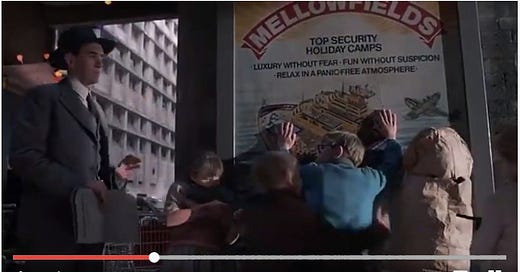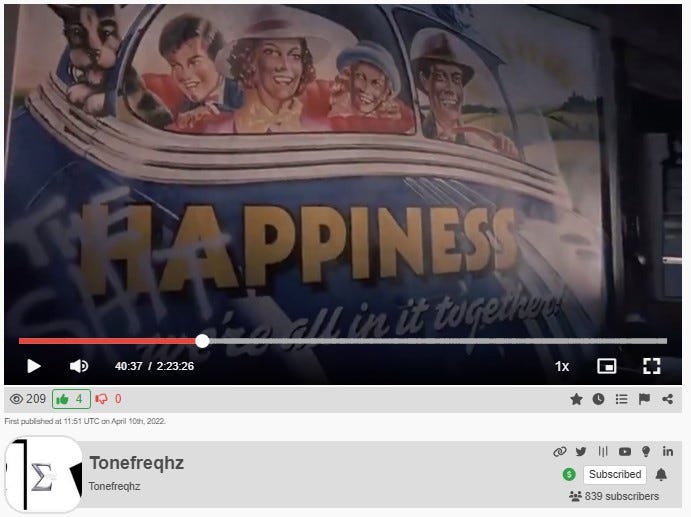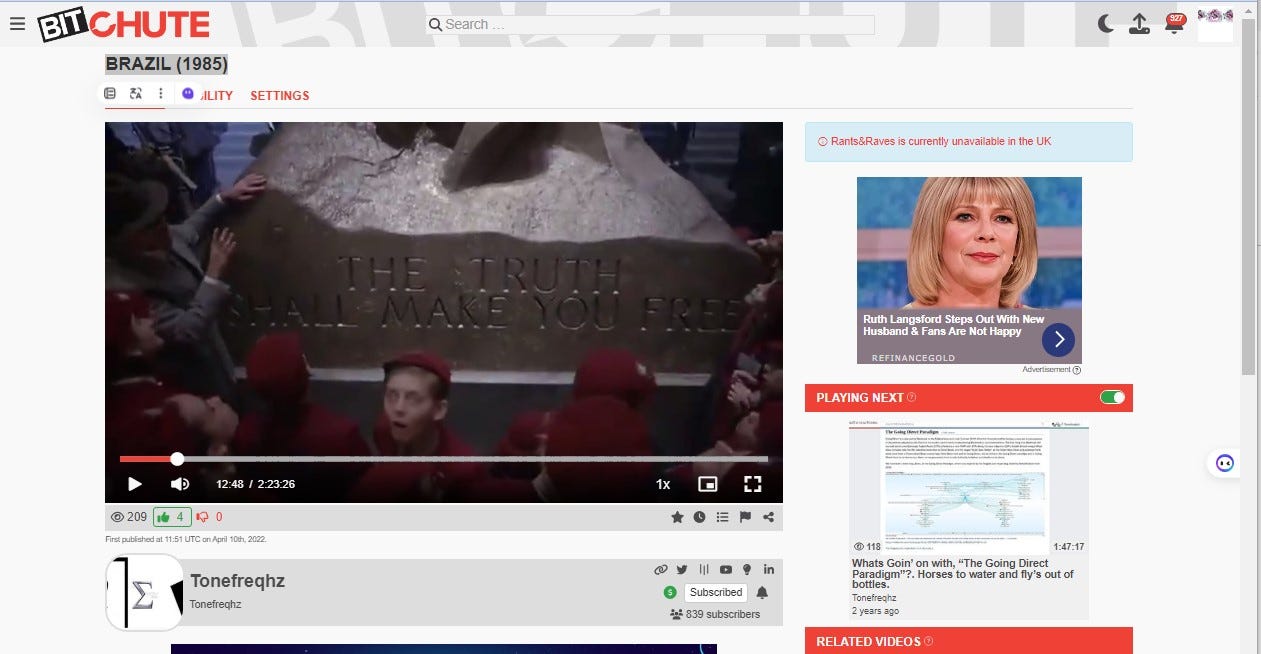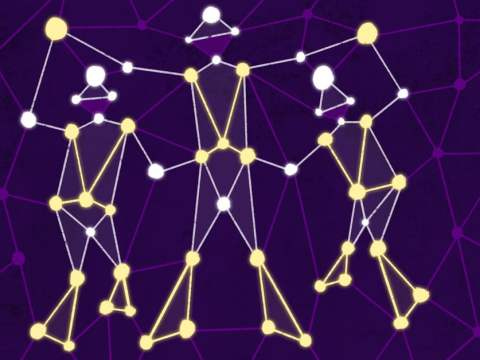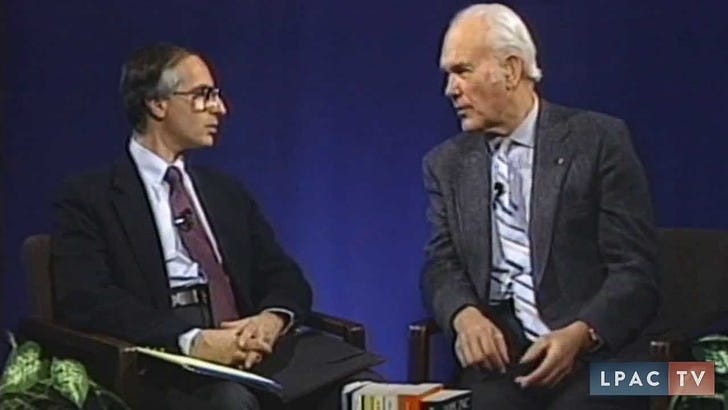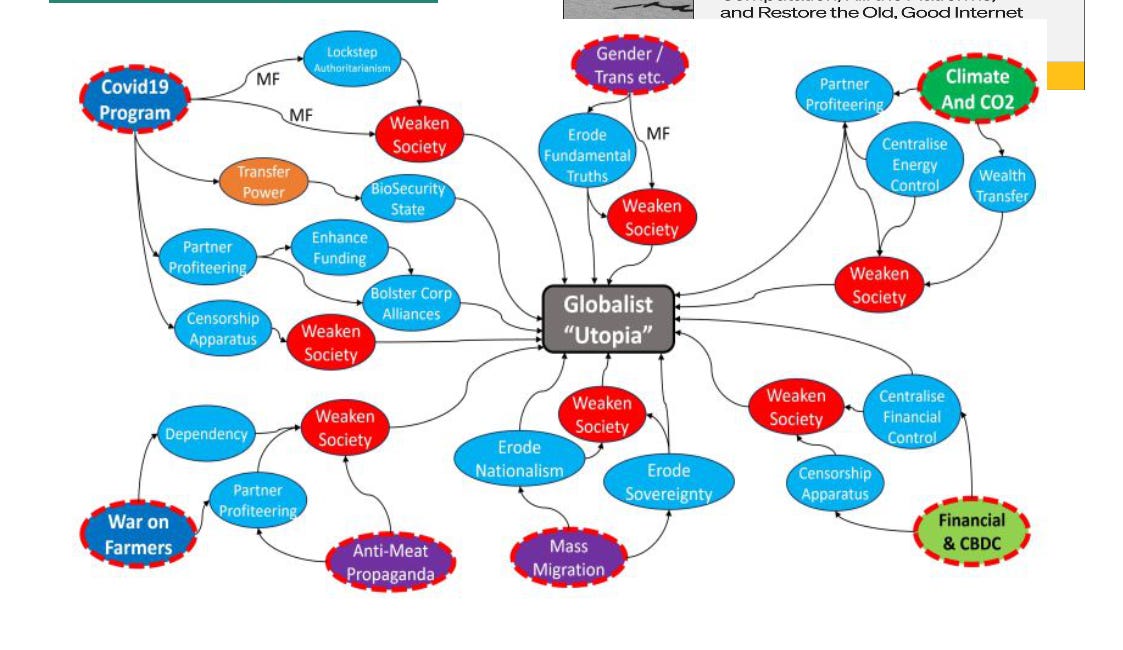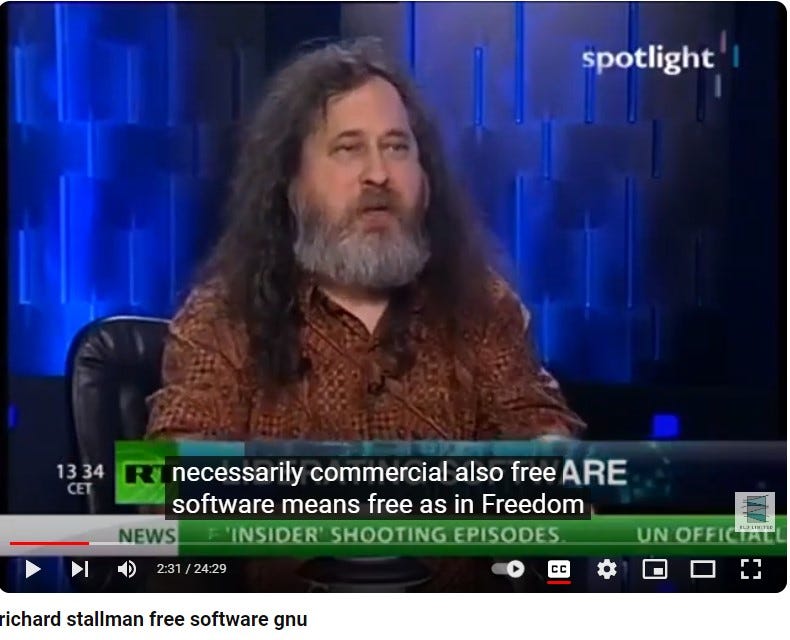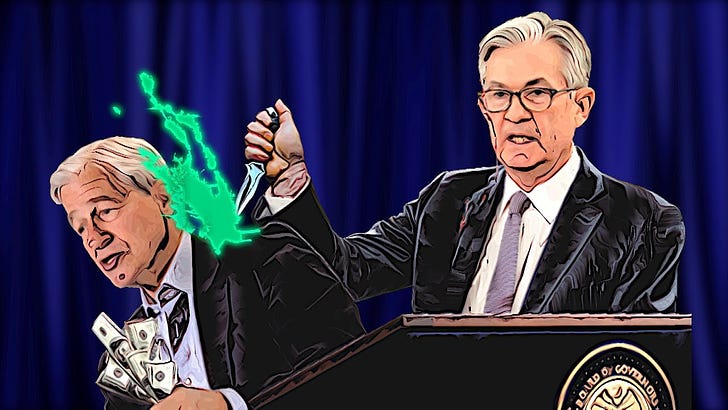Mellow Fields, Top Security Holiday Camps.
“Happiness We’re all in this together”
Whoever is eager to rival Pindar, Iullus, is flying with wings waxed with Daedalus’ aid, about to give his name to a glassy sea. #QED
ROGERGLEWIS APRIL 10, 2022 LEAVE A COMMENT
BRAZIL (1985)
“The Truth Shall Make You Free”.
In HD on You Tube ( if it lasts) It didn’t taken down today after a copyright strike lasted for two years.
Brazil is a 1985 dystopian black comedy film[9][10] directed by Terry Gilliam and written by Gilliam, Charles McKeown, and Tom Stoppard. The film stars Jonathan Pryce and features Robert De Niro, Kim Greist, Michael Palin, Katherine Helmond, Bob Hoskins, and Ian Holm.
The film centres on Sam Lowry, a low-ranking bureaucrat trying to find a woman who appears in his dreams while he is working in a mind-numbing job and living in a small apartment, set in a dystopian world in which there is an over-reliance on poorly maintained (and rather whimsical) machines. Brazil's satire of technocracy, bureaucracy, hyper-surveillance, corporatism and state capitalism is reminiscent of George Orwell's 1949 novel Nineteen Eighty-Four[11][12][13] and has been called Kafkaesque[14] and absurdist.[13]
Sarah Street's British National Cinema (1997) describes the film as a "fantasy/satire on bureaucratic society", and John Scalzi's Rough Guide to Sci-Fi Movies (2005) describes it as a "dystopian satire". Jack Mathews, a film critic and the author of The Battle of Brazil (1987), described the film as "satirizing the bureaucratic, largely dysfunctional industrial world that had been driving Gilliam crazy all his life".[15] Despite its title, the film is not about the country Brazil nor does it take place there; it is named after the recurrent theme song, Ary Barroso's "Aquarela do Brasil", known simply as "Brazil" to British audiences, as performed by Geoff Muldaur.[16]
Though a success in Europe, the film was unsuccessful in its initial North American release. It has since become a cult film. In 1999, the British Film Institute voted Brazil the 54th greatest British film of all time. In 2017, a poll of 150 actors, directors, writers, producers, and critics for Time Out magazine saw it ranked the 24th best British film ever.[17]
Hey there, weather enthusiasts! Let's talk about the wacky world of weather and how it affects everything from our daily plans to the very fish we eat. I mean, who knew that a little rain could cause such a ruckus, right?
So, I was watching this video about the importance of weather, and let me tell you, it was a real eye-opener. Did you know that almost half the planet doesn't have full weather data? I mean, that's like trying to drive a car with only 15% of the drivers having license plates. Can you imagine the chaos? It's like a real-life game of bumper cars out there in the high seas!
And speaking of the high seas, did you know that we know more about the moon than we do about the bottom of the ocean? I mean, we've only just started mapping the ocean floor, and we've already brought back more moon rocks than we have explored the ocean. It's like we're more interested in outer space than our own backyard. Come on, people, let's show the ocean some love!
But it's not just about exploring the ocean; it's also about taking care of it. I mean, we're dumping so much plastic into the ocean that there are now giant gyres of plastic floating around. We even have a new state called "garbage"! Can you imagine going on vacation to Garbage Island? I hear the beaches are to die for...literally.
And let's not forget about the impact of climate change on the ocean. It's not just about storm damage and decreased wheat yields; it's also affecting fish populations and shellfish production. I mean, if the fish are swimming slower because of an oil spill, then something's definitely fishy, right?
So, what can we do about all of this? Well, how about creating a digital currency for social good based on our joint ownership of the global commons? We could place a value on fish like never before and use the profits to fund ocean conservation efforts. And hey, why not all become joint citizens of our global commons? We all have a stake in this, so let's come together as one big ocean-loving community!
In conclusion, let's give the ocean the attention it deserves. After all, it's not just a giant blue blob on a map; it's a vital part of our planet that needs our love and care. So, next time you check the weather or order seafood, think about the impact it has on the ocean. And maybe, just maybe, we can all work together to make a splash in ocean conservation. Thanks for reading, and remember to keep calm and love the ocean!
1. Importance of Weather: The weather has a significant impact on various aspects of our lives, including agriculture, travel, and daily activities. It is essential for farmers to determine the best time for planting, harvesting, and managing crops.
2. Weather Channel for High Seas: The introduction of the Weather Channel for the high seas, particularly in the Arctic region, marks a significant milestone in meteorological data availability. This development provides crucial information for areas that were previously lacking comprehensive weather forecasts.
3. Disparities in Exploration Budgets: Discrepancies in exploration budgets between space and ocean exploration have led to gaps in our understanding of the ocean's depths. The limited exploration of the ocean floor contrasts sharply with the extensive mapping of the moon, highlighting the need for increased focus on ocean exploration.
4. Impact of Illegal Fishing: Inadequate tracking of fishing vessels in the high seas has led to illegal fishing practices, including exceeding quotas and targeting endangered species. This poses a significant threat to marine biodiversity and the sustainability of fishing stocks.
5. Plastic Pollution: The pervasive issue of plastic pollution in the world's oceans poses a severe threat to marine ecosystems. The accumulation of plastic waste, including microplastics, has led to the formation of large gyres in the oceans, impacting marine life and contributing to environmental degradation.
6. Environmental Impacts: Catastrophic events such as the Fukushima nuclear disaster and the BP oil spill have had far-reaching environmental consequences, including radioactive contamination and detrimental effects on marine habitats and species.
7. Climate Change and Ocean Acidification: Climate change is contributing to ocean warming and acidification, affecting marine life, including shellfish production. These changes have implications for food security and ecosystem stability.
8. Ocean Microbes and Ecosystem Health: The intricate web of ocean microbes plays a crucial role in maintaining ecosystem balance and productivity. Any alterations in ocean chemistry can have profound effects on these microbial communities and broader marine ecosystems.
9. Economic Costs of Climate Change: The economic impacts of climate change, including storm damage, agricultural yield reductions, and increased spending on adaptation measures, underscore the urgency of addressing environmental challenges.
10. Global Commons Ownership: Emphasizing the concept of joint ownership of the global commons, including the oceans, can foster a sense of collective responsibility and stewardship for marine resources. This approach could lead to innovative solutions for sustainable management and conservation.
11. Digital Currency for Social Good: Exploring the potential for a digital currency tied to the value of marine resources could provide a mechanism for reinvesting profits into conservation efforts and addressing challenges that traditional government funding struggles to cover.
12. Citizenship of Global Commons: Encouraging individuals to consider themselves as joint citizens of the global commons, with a shared interest in ocean health and sustainability, can promote a sense of global community and collective action towards preserving marine environments.
These ideas reflect the importance of addressing critical issues related to weather forecasting, ocean exploration, environmental conservation, and sustainable management of marine resources. By acknowledging the interconnectedness of these challenges and exploring innovative approaches, we can work towards safeguarding our oceans for future generations.
TUESDAY 28TH FEBRUARY ROG AND RANJAN DISCUSS #GFC2 #WatchingTheWheelsComeOff
1 year, 1 month ago
who-ate-all-the-pies. Bildeberg the Movie , The New HydroCarbon/Oil Standard
2 years, 4 months ago
One Good Cut, Banks are ripping us all off!!!
We could make one simple spending cut that could make all others unnecessary.
Here's Plan B: cut the benefits to bankers!
Banks are the most heavily subsidised businesses in the world, specially protected by governments. While the money runs out for the rest of us, the largest private banks still thrive. This is because they get the biggest subsidy of them all - the licence to print money.
Hard to believe? Martin Wolf, the Chief Economics Editor at the Financial Times, said it recently: "The essence of the contemporary monetary system is the creation of money, out of nothing, by private banks' often foolish lending..."
You heard that right. Private banks create money out of nothing! Then they loan it to us and ask for interest on top!
If you've ever wondered why the bank buildings around the world soar higher than any palace or spire ever did, you now have the answer.
But the banks don't simply print money using secret printing presses in their basements. They don't have to. Like so many other things these days, printing money has now gone digital. With the popular use of debit cards, electronic fund transfers, and internet banking, only 3% of the money in the UK is now made of paper and metal coins. The other 97% is entirely in computers. Electronic money is convenient for everyone, but it's especially convenient for the private banks, since they own, run, and control the entire digital money system.
And what do they do with this special privilege? Do they channel new money, the blood supply of the nation, towards the things we need like hospitals, schools, universities and public transport?
Not if it doesn't make a profit for them. Instead they use their licence to print money to gamble on the financial markets and pushing house prices out of reach of ordinary people by pumping hundreds of billions of pounds into risky mortgages. This is exactly how the banks caused the financial crisis, and now the rest of us are being asked to pay for it.
George Osborne is essentially asking us to protect the gambling habits of a gang of overpaid paper pushers by raising taxes and slashing public services, both of which hurt the poor more than the rich. If we can't afford to run hospitals and build schools, can we really afford to subsidise the financial industry? Should we have to live with less so the bankers can have more?
This is ludicrous, and it's time to put a stop to it. The private banks can't be trusted to hold the reins to our entire economy.
Instead of cutting vital public services so that bankers can continue to enjoy the high life, we need to take away the bank's power to create money out of nothing. This will stop them from causing yet another financial meltdown and allow us to afford the crucial services that we as a society need.
So join us in sending this message straight to Mr. Osborne: there is a Plan B for the UK economy. Cut the benefits to bankers out, not the things we care about!
Help us caption & translate this video!
4 years, 11 months ago
We lied , we stole we cheated. Pompeo Warmonger, Liar Cheat. Iran and Venezuela Hands off.
Pompeo Liar Cheat Theif
HighImpactFlixPublished on Apr 30, 2019
5 years ago
COVID19, AND THE ALT STATE CONNECTION. #SURPLUSENERGY #5G
March 1, 2020
ANALYSIS: TRUMP, COVID19, AND THE ALT STATE CONNECTION. #SURPLUSENERGY #DISINTERMEDIATEDDISTRIBUTIVEFINANCE @ADJYLEAK @STORJPROJECT @ERIKVOORHEES @WEARECHANGENYC @ALEXANDRIA @KIMDOTCOM @BLOCKTECHCEO @OPENINDEXPROTO @FLOBLOCKCHAIN @SUITPOSSUM @ACTIVISTPOST @DANDICKSPFT @ILUVCO2 @PIERS_CORBYN @IAN56789 @JUANBENET @FREE_ROSS @REALBITCOINWIKI @AANTONOP @BRETT_SHAVERS @OPENINDEXPROTO @SUITPOSSUM @MRTARDIGRADEUK @2013BOODICCA @FINANCIALEYES @JOEBLOB20
In today's rapidly evolving world, the future seems uncertain, especially with the looming prospect of permanent furloughs. As we navigate through this uncertainty, it's natural to wonder about the kind of world we will inhabit tomorrow.
The concept of tomorrow is often associated with technological advancements and societal shifts. SuperSpeed highways, plastic Packard's, and streamline cities may be some of the hallmarks of the future. The evolution of television, as highlighted by Dr. Rusty's Caldwell, is set to play a significant role in shaping our post-war world. With television becoming an integral part of our lives, it is essential to understand its impact on our society.
Television, often regarded as a source of entertainment and information, holds a deeper influence on our minds than we realize. The text delves into the psychological impact of television, shedding light on how it induces a state of receptiveness akin to hypnosis. This insight prompts us to question the extent of influence that television exerts on our thoughts and behaviors.
Furthermore, the text delves into the darker side of media manipulation, discussing the use of subliminal messages and neuro-linguistic programming (NLP) to sway public opinion and influence consumer behavior. The mention of video news releases (VNRs) and their role in shaping public perception serves as a stark reminder of the power wielded by media conglomerates.
The narrative also touches upon the potential ramifications of media influence, such as desensitization to violence and the erosion of individual rights. It highlights the ethical implications of using media as a tool for psychological conditioning and societal control.
Amidst these thought-provoking insights, it becomes evident that the impact of media extends beyond mere entertainment. It permeates our consciousness, shaping our beliefs, values, and perceptions without us even being aware of it.
As we contemplate the future and the kind of world we are destined to inhabit, it is crucial to critically analyze the role of media in our lives. By understanding the mechanisms at play and being mindful of the subtle influences exerted by television and other forms of media, we can strive to retain autonomy over our thoughts and actions.
In conclusion, the text prompts us to reflect on the pervasive influence of media in shaping our collective mindset. It serves as a reminder to approach media consumption with discernment and awareness, thereby safeguarding our individual agency in an increasingly interconnected world.
https://twitter.com/GrubStreetJorno/status/1234014565307965441
see at 16.08 Coronovirus and 5G.
I. Introduction
A. Overview of the Current Situation
B. Concerns about the Future
II. Impact of Television and Media
A. Influence on Society
B. Role in Shaping Perceptions
C. Use of Television as a Tool for Manipulation
D. Psychological Effects on Viewers
III. Historical Context
A. Evolution of Television and Media
B. Government Experiments and Mind Control
C. Use of Subliminal Messaging
D. Neuro-Linguistic Programming (NLP) in Media
IV. Ethical and Moral Implications
A. Responsibility of Media Outlets
B. Manipulation of Information
C. Impact on Public Perception and Behavior
D. Violation of Individual Rights
V. Societal Ramifications
A. Desensitization to Violence
B. Creation of Fear and Anxiety
C. Loss of Critical Thinking Skills
D. Erosion of Community and Human Interaction
VI. Government and Corporate Influence
A. Control of Information and Programming
B. Use of Video News Releases (VNRs)
C. Influence of Corporations on Media Content
D. Political Agendas and Media Propaganda
VII. Spiritual and Philosophical Perspectives
A. The Role of Media in Spiritual Understanding
B. Impact on Moral and Ethical Values
C. Need for a Spiritual Dimension in World Politics
D. Human Life and its Connection to the Spiritual World
VIII. Conclusion
A. Call for Awareness and Critical Analysis
B. Importance of Upholding Ethical Standards in Media
C. Need for Conscious Consumption of Information
D. Reflection on the Impact of Media on Society
The development and testing of new weapons systems has historically involved the use of human subjects to refine and perfect these technologies. Whether it be chemical, biological, nuclear, or in the case of microwave and radio frequency radiation weapons, human experimentation has been a crucial part of the process.
Throughout history, both the United States and its adversaries have utilized human subjects to perfect various weapons systems. This experimentation has taken place during times of both war and peace. One documented instance of human experimentation in the development of microwave non-lethal weapons occurred at the end of World War 2, where captured Japanese documents revealed the use of prisoners-of-war in terminal experiments involving microwave heating.
The necessity of human test subjects becomes especially evident when examining one facet of non-lethal weapons known as cyclotronic resonance. This concept involves the resonance or spinning of small particles with a specific frequency, allowing for the targeted manipulation of chemical or biological agents within enemy populations. The potential destructive capabilities of such weapons highlight the importance of human testing in their development.
In contemporary times, the concealment of radio frequency technologies has become increasingly sophisticated, with cell phone towers and antennas being disguised within various structures such as palm trees, water towers, and even church steeples. This blending of technology into everyday surroundings underscores the covert nature of modern non-lethal weaponry testing.
The manipulation of radio frequency energy to affect the human mind has been a subject of scientific experimentation for decades. The military has shown keen interest in this area, exploring the potential for using radiofrequency energy as a non-lethal weapon to disrupt normal behavior and even control emotions on a mass scale.
The implications of such technologies are profound, with the ability to induce fear or relaxation in large populations through carefully programmed electromagnetic frequencies. The ethical considerations surrounding these capabilities are complex, as they raise concerns about the potential for mass manipulation and control.
In conclusion, the development and testing of non-lethal weapons, particularly those utilizing radio frequency energy, have significant ethical and societal implications. The use of human test subjects in refining these technologies underscores the need for careful consideration of the ethical and moral implications associated with such advancements in weaponry. As these technologies continue to evolve, it is essential to approach their development and implementation with a deep understanding of their potential impact on humanity.
Never believe anything until its officially denied?
https://notthegrubstreetjournal.com/2020/02/29/165-to-catch-a-falling-knife/
http://www.golemxiv.co.uk/2020/02/corona-virus-africa-update-and-peek-into-the-near-future/
It’s been one of those weeks where, at the end of it, it’s not that one doesn’t know what to write, but rather where to start: Assange, COVID19, SPA embezzlement, the US primaries, infantile EU trade negotiation tactics, Whitehall hatred of Priti Patel, whither the BBC, and trillions of dollars being wiped off bourse values around the world.
Before getting into my usual contrarian assessment about the hierarchy of news “importance”, I have to kick off with what for me is Poison of the Week – or POW, as in prisoner of the war on Truth. Unsurprisingly, it comes from the Democratic Party, and this is the resultant headline from a mainstream US website:
The New York Times Magazine, CNN and several others among the usual suspects have invented (there is no other verb I know to do this injustice justice) a scenario in which Trump thinks the election was…
View original post 720 more words
30,380 views Apr 11, 2019 #modularhomes #buildbuildbuild #BIM
Fresh-faced young Michael Rimmer worms his way into an opinion poll company and is soon running the place. He uses this as a springboard to get into politics, and in the mini-skirted ... See full summary » Director: Kevin Billington Writers: Peter Cook (screenplay), John Cleese (screenplay) | 2 more credits » Stars: Ann Beach, Desmond Walter-Ellis, Peter Cook | https://www.imdb.com/title/tt0066302/#Homeatics#affordable#offsite#modularhomes#Modularapartments affordable off site modular homes & apartments #MMC#OffsiteConstruction#BOPAS#BIM The Brand @homeatix #Home@ix, The Ranges #Loftm@ix #Stylem@ix #Silverm@ix #Housem@ix #Verrym@ix #Mortgagemaxm@ix Everything we do is Driven by the Homemaker #MMC#OffsiteConstruction#BOPAS#BIM#smarttech#buildbuildbuild#DfMA#socialhousing#modularbuilding#DigitalConstruction#modularhomes#housing#construction#constructionuk#offsite#mmc#HousingForAll#Volumetric#housingdeliveryevolved#rethinkmodular#homesforthecommunity#offsiteconstruction#Category7
4 years ago
The Banned London Real David Icke Interview
4 years ago
Vaxxed II: The People's Truth (2019) **blocked copyright**
4 years, 1 month ago
House of Numbers: Anatomy of an Epidemic #CovidPurpose
4 years, 1 month ago
5G LED VIRUS LINK WITH 55 MILLION GENOCIDE PLANNED IN UK FOR 2025 - RESISTANCE WWW.SAVEUSNOW.ORG.UK
4 years ago
7/7 Ripple Effect 2, Deep State False Flag Evidence
5 years, 1 month ago
4 years ago
Dr. Rashid Buttar THE CORONAVIRUS AGENDA - WHAT THE MAINSTREAM MEDIA DON'T WANT YOU TO KNOW
4 years ago
4 years, 1 month ago
A mind-blowing interview with Judy Mikovits, PhD. Big Pharma Suppressing remedies
4 years, 1 month ago
https://goingdirectparadigm.com/2023/06/17/the-going-direct-paradigm-mindmap/
Mind Map
https://bra.in/6pdemJ
Going Direct is a plan put by Blackrock to the Federal reserve in Late Summer 2019. All of the financial realities facing us now are a consequence of the policies adopted by the Fed and the world’s central banks implementing Blackrocks’s recommendations. The first thing that Blackrock did was bail out its own Exchange Traded Funds (ETFs) effectively a new TARP with ETFs being the new subprime CDF’s (Credit default swaps) What Klaus Schwam calls the 4th industrial revolution or Great Reset, and the slogan “Build Back Better”, all the Green New Deals and promised fresh starts stem from a Financialised Bean counter logic from Black rock and its Going Direct, we are living in the Going Direct paradigm and in Going Direct there is no democracy, there are no grassroots there is only Authority to below and obedience to above.
We have built a mind map, Brain, of the Going Direct Paradigm, which was inspired by the Tragedy and Hope blog, Brain by Richard Grove from 2018.
https://longhairedmusings.wordpress.com/
Manipulation, The Money Changers. We are Stardust, We are golden We are Billion Year Old Carbon.
“We are Stardust, We are golden We are Billion Year Old Carbon”.
Sit Rep Special, Re-Occupy The Establishment
I had one of my all to infrequent catch ups with John Ward at the Slog earlier this afternoon as ever we agree on many things but as John says we seem to arrive at similar positions having read a different book and having approached from different directions.
Rates Were Raised too far too Fast
The rapid increase in interest rates followed by a prolonged high rate environment has raised concerns and prompted questions about the underlying reasons. The narrative surrounding the second phase of Blackrock's Going Direct initiative, the abrupt switch in leadership, and the subsequent reactions have fueled skepticism and speculation. The potential …


